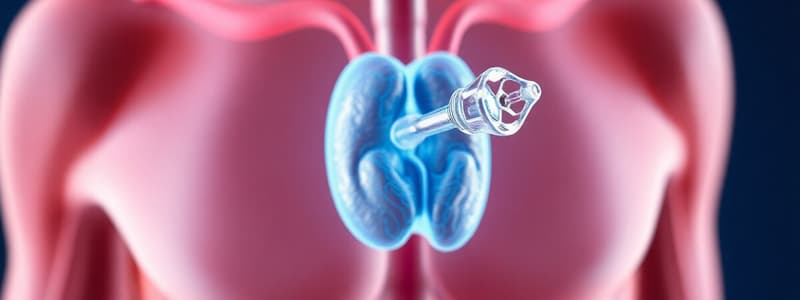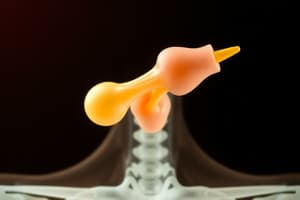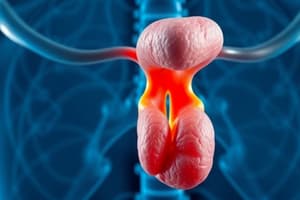Podcast
Questions and Answers
What is a primary cause of hypo- or hypersecretion of anterior pituitary hormones?
What is a primary cause of hypo- or hypersecretion of anterior pituitary hormones?
- Deficiencies in nutrition and diet
- Obesity and body composition changes
- Effects of hypophysiotropic hormones
- Hypo- or hypersecretion of anterior pituitary cells (correct)
Which factor does NOT influence the secretion pattern of Growth Hormone?
Which factor does NOT influence the secretion pattern of Growth Hormone?
- Age and gender
- Chronic diseases
- Air quality in the environment (correct)
- Normal levels of other hormones
Which of the following statements regarding Growth Hormone is true?
Which of the following statements regarding Growth Hormone is true?
- It is a single chain composed of 200 amino acids
- It solely determines the final height and growth in individuals
- Its secretion remains constant throughout life
- It contributes to body growth but is not the only factor (correct)
What is the role of somatostatin in relation to growth hormone?
What is the role of somatostatin in relation to growth hormone?
What condition occurs due to defects in the levels of Prolactin?
What condition occurs due to defects in the levels of Prolactin?
Which condition is associated with a deficiency of growth hormone in children?
Which condition is associated with a deficiency of growth hormone in children?
What is the primary role of ADH/Vasopressin in the body?
What is the primary role of ADH/Vasopressin in the body?
What symptoms might an adult with growth hormone deficiency experience?
What symptoms might an adult with growth hormone deficiency experience?
What initial test is recommended to measure growth hormone deficiency?
What initial test is recommended to measure growth hormone deficiency?
What can cause a defect in GH production?
What can cause a defect in GH production?
What is the primary cause of nephrogenic diabetes insipidus?
What is the primary cause of nephrogenic diabetes insipidus?
Which of the following symptoms is NOT commonly associated with diabetes insipidus?
Which of the following symptoms is NOT commonly associated with diabetes insipidus?
What is the first-line treatment for syndrome of inappropriate ADH secretion (SIADH)?
What is the first-line treatment for syndrome of inappropriate ADH secretion (SIADH)?
What major effect is caused by excess levels of ADH in the bloodstream?
What major effect is caused by excess levels of ADH in the bloodstream?
Which one of the following is a notable symptom of severe hyponatraemia?
Which one of the following is a notable symptom of severe hyponatraemia?
What is the primary function of Arginine Vasopressin (ADH)?
What is the primary function of Arginine Vasopressin (ADH)?
Which receptors are stimulated by high concentrations of ADH, resulting in increased blood pressure?
Which receptors are stimulated by high concentrations of ADH, resulting in increased blood pressure?
Which factors are known to inhibit ADH secretion?
Which factors are known to inhibit ADH secretion?
What condition is characterized by a deficiency in ADH secretion?
What condition is characterized by a deficiency in ADH secretion?
What is the effect of increased serum osmolality on ADH secretion?
What is the effect of increased serum osmolality on ADH secretion?
What is the primary function of Growth Hormone (GH)?
What is the primary function of Growth Hormone (GH)?
What happens to the average plasma concentration of growth hormone as a person ages?
What happens to the average plasma concentration of growth hormone as a person ages?
Which hormone is known to restrain the release of ADH?
Which hormone is known to restrain the release of ADH?
What condition can result from a deficiency of Prolactin?
What condition can result from a deficiency of Prolactin?
Which hormone is primarily responsible for mediating the growth-promoting effects of growth hormone?
Which hormone is primarily responsible for mediating the growth-promoting effects of growth hormone?
What disorder is caused by an excess of Antidiuretic Hormone (ADH)?
What disorder is caused by an excess of Antidiuretic Hormone (ADH)?
What is the relation between severe volume loss and ADH secretion?
What is the relation between severe volume loss and ADH secretion?
How sensitive are volume receptors compared to osmoreceptors in regulating ADH secretion?
How sensitive are volume receptors compared to osmoreceptors in regulating ADH secretion?
What is the major source of circulating IGF-1 in the body?
What is the major source of circulating IGF-1 in the body?
Which hormone plays a crucial role in social bonding and labor?
Which hormone plays a crucial role in social bonding and labor?
What is a potential effect of excess Growth Hormone (GH) in adults?
What is a potential effect of excess Growth Hormone (GH) in adults?
At what age range is the average plasma concentration of growth hormone the highest?
At what age range is the average plasma concentration of growth hormone the highest?
Which statement about the secretion of growth hormone is correct?
Which statement about the secretion of growth hormone is correct?
Which disorder is linked to a deficiency in ADH?
Which disorder is linked to a deficiency in ADH?
What is the primary consequence of excess Prolactin in women?
What is the primary consequence of excess Prolactin in women?
Growth hormone primarily exerts its effects by acting directly on target cells. True or False?
Growth hormone primarily exerts its effects by acting directly on target cells. True or False?
What is the concentration of growth hormone in an otherwise normal person aged 40-70 years?
What is the concentration of growth hormone in an otherwise normal person aged 40-70 years?
Which hormone is primarily responsible for regulating water balance in the body?
Which hormone is primarily responsible for regulating water balance in the body?
Which of the following hormones is structurally similar to somatomedins?
Which of the following hormones is structurally similar to somatomedins?
What is a key symptom of growth hormone excess in childhood?
What is a key symptom of growth hormone excess in childhood?
Which treatment is commonly used for growth hormone deficiency?
Which treatment is commonly used for growth hormone deficiency?
How does acromegaly typically manifest after adolescence?
How does acromegaly typically manifest after adolescence?
What complication is commonly associated with growth hormone excess?
What complication is commonly associated with growth hormone excess?
What is a potential consequence of untreated growth hormone excess in childhood?
What is a potential consequence of untreated growth hormone excess in childhood?
Which of the following conditions can lead to nephrogenic diabetes insipidus?
Which of the following conditions can lead to nephrogenic diabetes insipidus?
What is a major effect of the syndrome of inappropriate ADH secretion (SIADH)?
What is a major effect of the syndrome of inappropriate ADH secretion (SIADH)?
Which of the following symptoms is associated with severe hyponatraemia from SIADH?
Which of the following symptoms is associated with severe hyponatraemia from SIADH?
What is the first-line treatment for managing SIADH?
What is the first-line treatment for managing SIADH?
What is true regarding the effects of exogenous ADH treatment in central diabetes insipidus?
What is true regarding the effects of exogenous ADH treatment in central diabetes insipidus?
What primarily stimulates the secretion of ADH due to hyperosmolar conditions?
What primarily stimulates the secretion of ADH due to hyperosmolar conditions?
Which statement correctly describes the effect of ADH on the kidneys?
Which statement correctly describes the effect of ADH on the kidneys?
How does hypovolemic shock affect ADH secretion?
How does hypovolemic shock affect ADH secretion?
Which condition is primarily associated with excessive release of ADH?
Which condition is primarily associated with excessive release of ADH?
What is the relative sensitivity of volume receptors compared to osmoreceptors in regulating ADH secretion?
What is the relative sensitivity of volume receptors compared to osmoreceptors in regulating ADH secretion?
What physiological changes occur at very high concentrations of ADH?
What physiological changes occur at very high concentrations of ADH?
How do cortisol and thyroid hormones influence ADH secretion?
How do cortisol and thyroid hormones influence ADH secretion?
What triggers the release of ADH in situations of plasma hypovolemia?
What triggers the release of ADH in situations of plasma hypovolemia?
Which hormone primarily mediates the growth-promoting effects that are associated with growth hormone?
Which hormone primarily mediates the growth-promoting effects that are associated with growth hormone?
What is primarily responsible for the release of circulating IGF-1 into the blood?
What is primarily responsible for the release of circulating IGF-1 into the blood?
In which age range is the average plasma concentration of growth hormone the lowest?
In which age range is the average plasma concentration of growth hormone the lowest?
What do somatomedins primarily exert in relation to growth hormone?
What do somatomedins primarily exert in relation to growth hormone?
What is one potential consequence of continuous secretion of growth hormone beyond the normal growing period?
What is one potential consequence of continuous secretion of growth hormone beyond the normal growing period?
How does growth hormone primarily interact with its target tissues to exert effects?
How does growth hormone primarily interact with its target tissues to exert effects?
At what age does the average plasma concentration of growth hormone begin to notably decline?
At what age does the average plasma concentration of growth hormone begin to notably decline?
Which action of growth hormone directly promotes the growth of long bones?
Which action of growth hormone directly promotes the growth of long bones?
How does growth hormone affect glucose levels in the body?
How does growth hormone affect glucose levels in the body?
What is a metabolic effect of excess growth hormone secretion?
What is a metabolic effect of excess growth hormone secretion?
What is the primary function of insulin-like growth factor 1 (IGF-1) in relation to growth hormone?
What is the primary function of insulin-like growth factor 1 (IGF-1) in relation to growth hormone?
Which physiological condition triggers the secretion of growth hormone?
Which physiological condition triggers the secretion of growth hormone?
In which way does growth hormone influence body composition in adults?
In which way does growth hormone influence body composition in adults?
Which of the following is NOT a direct effect of growth hormone on tissues?
Which of the following is NOT a direct effect of growth hormone on tissues?
What role does somatostatin play in the regulation of growth hormone secretion?
What role does somatostatin play in the regulation of growth hormone secretion?
What is the primary reason for the significant increase in height observed in the 10-year-old boy presenting with rapid growth?
What is the primary reason for the significant increase in height observed in the 10-year-old boy presenting with rapid growth?
Which hormone's elevation is primarily associated with spontaneous lactation in the 35-year-old woman with a pituitary adenoma?
Which hormone's elevation is primarily associated with spontaneous lactation in the 35-year-old woman with a pituitary adenoma?
What mechanism explains the low urine osmolality despite elevated serum sodium in the 50-year-old man?
What mechanism explains the low urine osmolality despite elevated serum sodium in the 50-year-old man?
In the case of the pregnant woman experiencing contractions, what role does the hormone oxytocin primarily play?
In the case of the pregnant woman experiencing contractions, what role does the hormone oxytocin primarily play?
What is the expected outcome following treatment with desmopressin in the patient diagnosed with central diabetes insipidus?
What is the expected outcome following treatment with desmopressin in the patient diagnosed with central diabetes insipidus?
Which of the following clinical signs would indicate a worsening condition in the 10-year-old boy diagnosed with gigantism?
Which of the following clinical signs would indicate a worsening condition in the 10-year-old boy diagnosed with gigantism?
Which of the following statements regarding the initial approach to treating the woman's pituitary adenoma is accurate?
Which of the following statements regarding the initial approach to treating the woman's pituitary adenoma is accurate?
What are the key features that help distinguish gigantism from acromegaly?
What are the key features that help distinguish gigantism from acromegaly?
Flashcards
Growth hormone's role
Growth hormone's role
Growth hormone (GH) is a single-chain amino acid crucial for overall growth, but it's not solely responsible. Other factors like genetics, diet, and absence of chronic stress also play a significant role.
GH secretion pattern
GH secretion pattern
GH secretion is not constant, it's pulsatile, meaning it occurs in bursts. The frequency and intensity of these bursts are influenced by factors like age, sex, nutritional status, sleep quality, body composition, stress, and physical activity.
Growth Hormone Deficiency
Growth Hormone Deficiency
Deficiency in GH, either due to problems with the pituitary gland itself (primary) or the hypothalamus (secondary), can lead to stunted growth, delayed puberty, and other developmental issues.
Excess Growth Hormone
Excess Growth Hormone
Signup and view all the flashcards
What does prolactin do?
What does prolactin do?
Signup and view all the flashcards
GH levels & age
GH levels & age
Signup and view all the flashcards
GH's indirect action
GH's indirect action
Signup and view all the flashcards
Most important IGF
Most important IGF
Signup and view all the flashcards
IGF-1 production
IGF-1 production
Signup and view all the flashcards
IGF-1 release mechanism
IGF-1 release mechanism
Signup and view all the flashcards
GH's metabolic roles
GH's metabolic roles
Signup and view all the flashcards
Single GH measurement accuracy
Single GH measurement accuracy
Signup and view all the flashcards
What is Somatostatin (GHIH)?
What is Somatostatin (GHIH)?
Signup and view all the flashcards
What is Growth Hormone Deficiency (GHD)?
What is Growth Hormone Deficiency (GHD)?
Signup and view all the flashcards
What happens when there's too much GH?
What happens when there's too much GH?
Signup and view all the flashcards
What is IGF-1?
What is IGF-1?
Signup and view all the flashcards
What is Laron Dwarfism?
What is Laron Dwarfism?
Signup and view all the flashcards
What is Nephrogenic Diabetes Insipidus (NDI)?
What is Nephrogenic Diabetes Insipidus (NDI)?
Signup and view all the flashcards
What is Diabetes Insipidus (DI)?
What is Diabetes Insipidus (DI)?
Signup and view all the flashcards
What is Syndrome of Inappropriate ADH Secretion (SIADH)?
What is Syndrome of Inappropriate ADH Secretion (SIADH)?
Signup and view all the flashcards
What is polyuria?
What is polyuria?
Signup and view all the flashcards
What is polydipsia?
What is polydipsia?
Signup and view all the flashcards
What is Vasopressin (ADH) and where is it produced?
What is Vasopressin (ADH) and where is it produced?
Signup and view all the flashcards
What is the antidiuretic effect of Vasopressin?
What is the antidiuretic effect of Vasopressin?
Signup and view all the flashcards
What is the pressor effect of Vasopressin?
What is the pressor effect of Vasopressin?
Signup and view all the flashcards
How does plasma osmolality regulate Vasopressin release?
How does plasma osmolality regulate Vasopressin release?
Signup and view all the flashcards
How does plasma volume affect Vasopressin release?
How does plasma volume affect Vasopressin release?
Signup and view all the flashcards
What is central DI?
What is central DI?
Signup and view all the flashcards
What is nephrogenic DI?
What is nephrogenic DI?
Signup and view all the flashcards
What is Growth Hormone's primary function?
What is Growth Hormone's primary function?
Signup and view all the flashcards
What is IGF-1 and its role in growth?
What is IGF-1 and its role in growth?
Signup and view all the flashcards
What are the disorders associated with GH deficiency and excess?
What are the disorders associated with GH deficiency and excess?
Signup and view all the flashcards
What is Prolactin's primary function?
What is Prolactin's primary function?
Signup and view all the flashcards
What are the disorders associated with excess Prolactin?
What are the disorders associated with excess Prolactin?
Signup and view all the flashcards
What is the primary role of Oxytocin?
What is the primary role of Oxytocin?
Signup and view all the flashcards
What is ADH/Vasopressin's primary function?
What is ADH/Vasopressin's primary function?
Signup and view all the flashcards
What are the disorders associated with ADH deficiency and excess?
What are the disorders associated with ADH deficiency and excess?
Signup and view all the flashcards
Study Notes
Hypothalamus-Pituitary Target Organ Axes: Feedback Control
- Learning Outcomes: Covering the role of Growth Hormone, Prolactin, Oxytocin, and ADH/Vasopressin, and how defects in their levels cause disease
- Class: Year 2 Endocrine and Breast Module
- Lecturer: Dr. Brona Murphy and Dr. Ebrahim Rajab
- Date: January 2024
Anterior Pituitary Hormones
- General: Specific hypo- and hyper-secretory conditions exist for most anterior pituitary hormones
- Causes: Conditions are caused by either
- Primary: Hypo or hypersecretion of the anterior pituitary cells
- Secondary: Hypo or hypersecretion of hypophysiotropic hormones
Growth Hormone (Somatotropin)
- Structure: Single chain, 191 amino acids
- Role in Growth: Essential for growth, but not solely determining final growth rate. Genetic factors, adequate diet, and absence of chronic disease/stress are also important
- Secretion: Pulsatile, serum concentration varies with age, gender, nutrition, sleep, body composition, stress, and exercise
- Measurement: Random serum GH measurement can be misleading, so diagnostic testing may require additional methods
Growth Hormone in the Body
- Concentration & Age: Average plasma GH concentrations decline with age. Levels are 6 ng/ml (5-20 years), 3 ng/ml (20-40 years), and 1.6 ng/ml (40-70 years)
- Metabolic Actions (Adults): Acts on liver, muscle, and adipose tissue to shift metabolism to lipid use for energy, conserving carbohydrates and proteins. It raises blood glucose (antagonizes insulin) and increases lipolysis.
- Overall Functions: Maintains adult cardiac function (contractility) and glucose homeostasis and supports bone mineralization, adipose balance, and muscle anabolism
- Biological Actions: Influences numerous tissues, promoting protein synthesis, influencing cell growth and function, and affecting lipid and carbohydrate metabolism.
Growth Hormone Promoting Effects
- Somatomedins (IGFs): GH acts indirectly on target cells via somatomedins, primarily IGF-1, which is majorly produced by the liver
- Growth Promotion: Stimulates linear growth via hyperplasia (increased cell division) and hypertrophy (increased protein synthesis) of bone and other organs
- Bone Growth: GH directly and indirectly promotes bone growth in thickness and length via IGF-1. It also stimulates chondrocytic and osteogenic cells
Role of Growth Hormone in the Body - Metabolic Actions
- Lipolysis and Lipid Oxidation: Increases fatty acids in the blood
- Protein Synthesis: Stimulates protein synthesis in most cells, particularly muscles
- Glucose Homeostasis: Raises blood glucose, counteracting the effects of insulin. Decreases peripheral insulin sensitivity, reducing glucose uptake by muscles
- Diabetogenic Effect: Because GH leads to insulin insensitivity/resistance, it can produce metabolic disturbances similar to type II diabetes
- Electrolyte Balance: Promotes phosphate, water, and sodium retention
Role in Overall Functions
- Adult Cardiac Function and Glucose: Maintains adult cardiac function (contractility) and glucose homeostasis
- Other Functions: Supports bone mineralization, adipose balance, and muscle anabolism
Role of Growth Hormone in the Body - Other Aspects
- Causes of GH Deficiency:
- Hypothalamic dysfunction, defect in GHRH
- Pituitary defect, defect in GH production
- Receptor defect, target cells failing to respond to GH
- Symptoms of GH Deficiency: vary depending on age (dwarfism in children, reduced skeletal mass/increased body fat in adults)
- Measuring GH Deficiency: testing IGF-1, followed by provocative testing (insulin-induced hypoglycemia)
- Treatment of GH Deficiency. Recombinant human GH
Causes of Growth Hormone Excess
- Tumors of GH Producing Cells: Anterior pituitary tumour
Symptoms of Growth Hormone Excess
- Gigantism (Childhood): Rapid growth in height without proportional distortion of body
- Acromegaly (Adulthood): Enlargement of hands, feet, jaw, and thickening of skin, bones. Increased cardiovascular mortality.
Prolactin
-
Secretion: Secreted by lactotropes in the anterior pituitary
-
Structure: 199-amino acid single chain protein
-
Primary Role: Stimulates milk production
-
Differences from other endocrine cells:
-
Not part of an endocrine axis
-
Predominantly under tonic inhibitory control by dopamine from hypothalamus
-
Dysfunction: Disruption of the pituitary stalk can lead to increased PRL, while other anterior pituitary hormones can decrease
-
Regulation: Tonically inhibited by dopamine, stimulated by prolactin-releasing factors (PRFs) under certain conditions such as suckling, stress, and estrogen
-
Effects in Women: Stimulated by elevated estrogen during pregnancy. Inhibits GnRH (and thus prevents ovulation) and stimulates breast development and milk production. Suckling maintains elevated PRL
-
Effects in Men: Not part of the normal male reproductive hormone feedback loop. It inhibits GnRH, potentially impacting spermatogenesis
-
Causes of Excess Prolactin: Physiological (pregnancy, breastfeeding, stress) and pathological (pituitary adenoma, drug-induced)
Prolactin Deficiencies
-
Causes: Isolated PRL deficiency is rare. Often associated with other pituitary hormone deficiencies
-
Symptoms: Decreased lactation
Lactotroph Adenoma
-
Commonest pituitary tumour: often the cause of female infertility
-
Treatment: First line medication with dopamine agonists (Cabergoline/Bromocriptine). Second line is surgery (transsphenoidal resection), radiation reserved for resistant/aggressive tumours
Oxytocin
- Role in Pregnancy & Labor: Increases gradually, sharply during labour. Stimulates uterine contractions; promotes milk ejection following delivery
- Social Interactions: Important for social interactions, including sexual arousal, recognition, trust and mother-infant bonding
Antidiuretic Hormone (ADH)/Vasopressin
-
Structure & Formation: Arginine vasopressin (AVP); Primarily formed in the supraoptic nuclei of hypothalamus
-
Regulation of Osmolarity: Regulates urinary water loss, ECF, and osmolarity.
-
Two Main Effects:
- Antidiuretic Effect: Enhances water retention by kidneys by increasing permeability of distal/collecting tubules to water; decreased urinary output.
- Pressor Effect: Causes contraction of arterioles
-
Release Regulation: Controlled by hypothalamic osmoreceptors and systemic baroreceptors.
-
Osmoreceptors: Maintain ECF within 280-295 mOsm/kg, a 1% rise in serum osmolality triggers ADH secretion.
-
Volume Receptors: Less sensitive than osmoreceptors; a 10-15% volume change leads to ADH changes
-
Inhibition: Cortisol and thyroid hormone restrain ADH release.
ADH Deficiency
- Causes: Diabetes insipidus from posterior pituitary (hypothalamic central DI)
- Causes Related to the Kidneys: Renal disease, mutations, and drugs (lithium)
- Symptoms: Polyuria (excessive urination) and polydipsia
ADH Over-Secretion (SIADH)
- Causes: Central nervous system (CNS) damage or secretion from abnormal sites (e.g., lung cancer)
- Effects: Electrolyte disturbance (hyponatremia), initial mild CNS symptoms, low urinary output.
Summary:
- Covering various hormones, their regulation, and disruptions affecting numerous body functions including homeostasis, reproduction, and growth.
- Each section describes the hormone, its function, and disorders related to either over- or underproduction.
Studying That Suits You
Use AI to generate personalized quizzes and flashcards to suit your learning preferences.
Related Documents
Description
Test your knowledge on the endocrine system, specifically focusing on anterior pituitary hormones. This quiz will cover topics such as growth hormone, ADH, prolactin, and their associated conditions. Assess your understanding of hormone secretion patterns and their physiological impacts.




